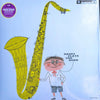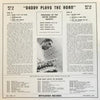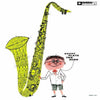





Dexter Gordon - Daddy Plays The Horn (Mono)
ORDER LIMITED TO ONE ITEM PER CUSTOMER
Dexter Gordon - tenor saxophone [click here to see more vinyl featuring Dexter Gordon]
Kenny Drew (piano) [click here to see more vinyl featuring Kenny Drew]
Leroy Vinnegar (bass), Larry Marable (drum)
1 LP, standard sleeve
Limited edition
Original analog Master tape: YES
Heavy Press : 180g
Record color : black
Speed : 33 RPM
Size : 12'’
Mono
Studio
Record Press: Pallas
Label: Pure Pleasure Records
Original Label : Bethlelem
Recorded in September 1955 in Hollywood, California, U.S.A
Re-mastering by Ray Staff at Air Mastering, Lyndhurst Hall, London
Originally released in 1956
Reissued in July 2013
Tracks :
Side A :
1. Daddy Plays The Horn
2. Confirmation
3. Darn That Dream
Side B :
1. Number Four
2. Autumn In New York
3. You Can Depend On Me1. Number Four
2. Autumn In New York
3. You Can Depend On Me
Reviews :
« During a period of Dexter Gordon's (tenor sax) life -- when he was deep in the throws of chronic drug addiction -- the artist was miraculously able to reignite his career during the latter part of 1955. After several years of being out of the spotlight, Gordon resurfaced on the Big Apple-based indie Bethlehem imprint with the half-dozen sides that comprise Daddy Plays the Horn (1956). Joining him as key constituents of the credited Dexter Gordon Quartet are Kenny Drew (piano), Leroy Vinnegar (bass), and Larry Marable (drums). While the support team provides Gordon top-notch contributions throughout, it is unquestionably Drew who offers the most in terms of active interaction and his prominence can not be overstated. Nowhere is that as noticeable as the good-natured interaction heard on the disc's opener, the Gordon-penned title composition "Daddy Plays the Horn." In fact it could be argued that Drew enhances the tenor to the point of practically being a co-leader. The update of Charlie "Bird" Parker's bop standard "Confirmation" is taken at a steady mid-tempo pace, allowing plenty of room for the participants to have their say and not get in the way of the melody. Gordon seems considerably more relaxed and comfortable as he spreads line upon line of inspired improvisation. Drew is once again a real treat to hear briefly taking charge of the rhythm section. The pair of ballads on Daddy Plays the Horn are nothing short of stellar and stand as simple, emotive expressions unto themselves. "Darn That Dream" embraces the warmth of Gordon's tenor as his sensual phrasing leaves just enough space for Drew to sonically bridge the gap with his own unhurried and stylish chords. The generically monikered "Number Four" is anything but ordinary. The Gordon original jumps right from the opening and the ensemble lets loose with equally solid licks beneath his cool tone. Drew gets in the driver's seat missing nary a measure to reveal what could easily be his most tasteful contributions to date. The same can be said of bassist Vinnegar, who is briefly spotlighted on an efficient (if not somewhat sparse) solo. "Autumn in New York" -- the album's other essential ballad -- is proof that despite Gordon's addiction, he had retained his singular and precious sense of lyricism. Indeed, the Great American Songbook entry has rarely been permeated in such a meaningful way. The seamless transitions between Gordon and Drew are further evidence of their undeniable bond. Saving what may be the best example of the gathered instrumentalists flexing their respective be-bop muscle, "You Can Depend on Me" rounds out the platter with a bang. Each bandmember gets a final opportunity to shine -- which they individually take full advantage of. In 2005, the Shout! Factory label reissued Daddy Plays the Horn, placing the six selections in the correct running order, and the digital remastering by Randy Perry has the classic sounding better than ever. » AllMusic Review by Lindsay Planer
"Bethlehem Records was a major jazz label in the 1950's formed by Gus Wildi with an impressive roster of artists including singers Nina Simone, Carmen MacRae, Chris Conner & Mel Torme, to name a few; arrangers: Marty Paich, Russ Garcia, Frank Hunter; and musicians including: Dexter Gordon, Roland Kirk, Charles Mingus, Frank Rosolino, Herbie Mann, Stan Levey, Art Blakey, Milt Hinton, Errol Garner, Zoot Sims, Duke Ellington, JJ Johnson and many, many others.
The label distinguished itself by giving artists creative control of their projects and presented albums of rather cutting edge graphic design. Its legacy is a lengthy discography that freshly and ambitiously captured and preserved an era of truly amazing music including West Coast Cool Jazz, East Coast Bop, and Vocalists. For many of the artists, their first or greatest recorded work happened at Bethlehem. By trusting its staff and artists to make their own creative decisions, to experiment, and thus to flourish, Bethlehem actively helped create and not just document a whole and diverse era of Jazz music.
During a period of Dexter Gordon's (tenor sax) life -- when he was deep in the throws of chronic drug addiction -- the artist was miraculously able to reignite his career during the latter part of 1955. After several years of being out of the spotlight, Gordon resurfaced on the Big Apple-based indie Bethlehem imprint with the half-dozen sides that comprise Daddy Plays the Horn (1956). While the support team provides Gordon top-notch contributions throughout, it is unquestionably Drew who offers the most in terms of active interaction and his prominence can not be overstated. Nowhere is that as noticeable as the good-natured interaction heard on the disc's opener, the Gordon-penned title composition "Daddy Plays the Horn." In fact it could be argued that Drew enhances the tenor to the point of practically being a co-leader. The update of Charlie "Bird" Parker's bop standard "Confirmation" is taken at a steady mid-tempo pace, allowing plenty of room for the participants to have their say and not get in the way of the melody. Gordon seems considerably more relaxed and comfortable as he spreads line upon line of inspired improvisation.
Drew is once again a real treat to hear briefly taking charge of the rhythm section. The pair of ballads on Daddy Plays the Horn are nothing short of stellar and stand as simple, emotive expressions unto themselves. "Darn That Dream" embraces the warmth of Gordon's tenor as his sensual phrasing leaves just enough space for Drew to sonically bridge the gap with his own unhurried and stylish chords. The generically monikered "Number Four" is anything but ordinary. The Gordon original jumps right from the opening and the ensemble lets loose with equally solid licks beneath his cool tone.
Drew gets in the driver's seat missing nary a measure to reveal what could easily be his most tasteful contributions to date. The same can be said of bassist Vinnegar, who is briefly spotlighted on an efficient (if not somewhat sparse) solo. "Autumn in New York" -- the album's other essential ballad -- is proof that despite Gordon's addiction, he had retained his singular and precious sense of lyricism. Indeed, the Great American Songbook entry has rarely been permeated in such a meaningful way. The seamless transitions between Gordon and Drew are further evidence of their undeniable bond. Saving what may be the best example of the gathered instrumentalists flexing their respective be-bop muscle, "You Can Depend on Me" rounds out the platter with a bang." Audio Beat Review
Ratings :
AllMusic: 4 / 5 , Discogs : 4.53 / 5


